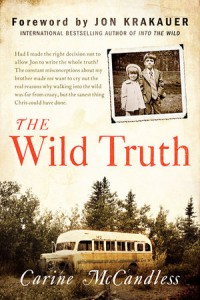The Wild Truth, by Carine McCandless
This review of Carine McCandless's memoir, “The Wild Truth," was published November 2014 in The Seattle Times.
 For many people, the mystery behind Chris McCandless’ plunge into the Alaskan wilderness, where he walked alone for months and ultimately died, was a key element in Jon Krakauer’s 1996 book “Into the Wild,” which chronicled that journey.
For many people, the mystery behind Chris McCandless’ plunge into the Alaskan wilderness, where he walked alone for months and ultimately died, was a key element in Jon Krakauer’s 1996 book “Into the Wild,” which chronicled that journey.
Krakauer’s slim volume, which has since become a best-seller, traces McCandless’ path from privileged college graduate to vagabond, and it has enjoyed remarkable staying power — spawning a film directed by Sean Penn and joining the required reading lists in many high-school English classes. (Both things that the young man at its center likely would have abhorred.)
Reasons for this popularity are many — surely, many of us identified with the wish to break away — but plenty of readers saw McCandless as nothing more than an immature youth playing out adolescent rebellion against his bewildered parents, left back home in suburban Maryland without a clue to his whereabouts.
Now comes “The Wild Truth” (HarperOne, 304 pp., $27.99), written by Chris’ sister Carine McCandless, which attempts to finally answer the why behind that lonely trek and silence those who suggest the young man was mentally ill. In fact, says Carine, her brother’s decision was “the sanest thing he could have done.”
Primarily a family memoir, “The Wild Truth” describes life in the deeply fractured McCandless home as an existence framed by emotional and physical violence, alcoholism and chronic lying.
The root of it all, in Carine’s telling, is Walt McCandless, who fathered Chris and Carine, acting the upstanding dad while he had an entire family living across town with five other children. For a while he lied to both mothers, pretending to be true to each while shuttling between his two homes.
“That’s why I don’t stay in contact with them,” Chris McCandless wrote to his sister after discovering his father’s dishonesty and his mother’s willingness to enable it. “It’s like a disease which can be caught, if one is exposed to it too long.”
In “The Wild Truth,” we see that many of Chris McCandless’ qualities, described so memorably in “Into the Wild,” were already evident in childhood: a love of nature, a facility with music and, most tellingly, a vicious asceticism:
“… even though he was getting cold, he stayed there, shivering, piling the sand higher and higher until he was satisfied with its stature,” writes his sister, recalling a 10-year-old Chris making a sand mountain at the beach. “The image of him shaking remains so vivid … He didn’t complain about being cold, but I saw his teeth chattering and the ache in his eyes.”
In Krakauer’s original story, the McCandless family secrets are alluded to, but only briefly. Carine tells us now that she insisted on this as a condition of the family’s cooperation. One wonders how her brother, incensed by hypocrisy, would have felt about that decision.
Carine McCandless has apparently asked the same question and reversed herself. Hiding the ugly truth did nothing but allow it to fester, she writes, penning a devastating portrait of her lying father and complicit mother.
And yet, for years before Billie McCandless learned of her son’s death, she would tape a note to the front door every time she left home, just in case Chris should someday return.
This review has been corrected from the original published in The Seattle Times.
